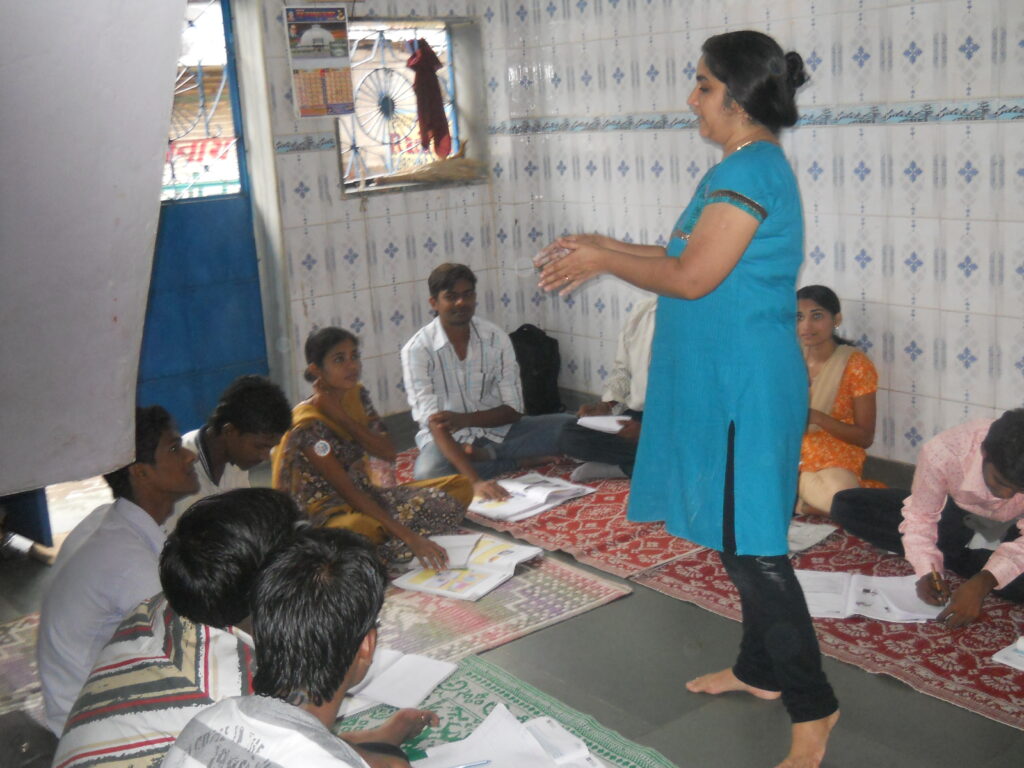In the area of education, our work spans a wide range of programs from advocacy to implementation. The community that we work in consists largely of people who have been left behind in terms of opportunities and are looking at building new skills to help them follow a vocation of their choice. Our initiatives impact both children and adults by providing them with opportunities to learn and subsequently employ their skills meaningfully.
Spoken English Classes:
PSS teamed up with Times of India in 2011 to launch their flagship Teach India program to conduct spoken English classes for underprivileged communities in our area of work. Through this program, we train youth between the ages of 18 and 32 years in spoken English. The training program model is designed to impart basic knowledge of the English language and skills to make them employable, particularly in the service sector. Over 100 days, learners become ‘job-ready’, after which we facilitate their placement for employment through job fairs.
Within a year of our partnership with TOI alone, we successfully mobilised and trained 600 youth from the community and provided employment to 40% of them. This number has been steadily increasing over the years and we have successfully trained over 4000 youth till date.. While PSS receives financial and technical support from the Times of India group to implement this program. PSS is responsible for reaching out to the underprivileged who would benefit from the program, and managing the classroom logistics and day-to-day affairs at the teaching center. PSS has been able to conduct an average of 12 batches (each batch consisting of 20-25 youth) in the community every year.
(Include Pics from folder)
Program outreach
| 2012-13 | 2013-14 | 2014-15 | 2016-17 | 2017-18 | |
| Total number of Participants | 600 | 850 | 1400 | 153 | |
| Percentage of students placed | 40% | 45% | 55% | 55% |

Right to Education Act:
Education is a fundamental human right, essential for the empowerment and development of individuals and society as a whole. The RTE Act is an essential step towards improving each child’s access to primary and secondary education. The Act contains specific provisions for disadvantaged groups such as child labor, migrant children, children with special needs, or those who have a disadvantage owing to social, cultural, economic, geographical, linguistic, gender or any such factor. With the implementation of this Act, it is anticipated that issues of school dropout and out-of-school children will also be addressed, through quality of education and availability of trained teachers.
PSS strives to spread awareness about RTE among its stakeholders. We hold regular meetings with School Management Committees (SMC) to make them aware of their roles and responsibilities, and to build accountability. SMCs comprising local officials, parents, guardians and teachers have been mandated under the RTE to form School Development Plans and to monitor the utilization of government grants and the school environment. During PSS meetings and awareness campaigns, roles and responsibilities of all stakeholders in the development of a school get highlighted and stress is laid against misuse of funds. This is also a platform for us to meet parents in the community and emphasize the importance of sending their children to school. We show them how education can enhance equality, freedom, dignity and open up opportunities for their children.
Balwadi:
Balwadi is an Indian Pre School for economically weaker sections of the community. These schools run economically but scientifically using as many educational aids as possible, prepared from locally available material.
In 2018, PSS accepted the project to educate the kids ageing from 3-6 years in the Malad Dindoshi area by setting up Balwadis. This facility is being provided to the entire population of that area (approximately 50,000) who do not have access to state government aided pre-school facilities for their children. These Balwadis have considerably reduced the travel time to school for the young children. Going forward, we plan to set up at least 10 more Balwadis around the Kandivali-Malad suburbs to reach out to a larger population who are in need for pre-school facilities.
